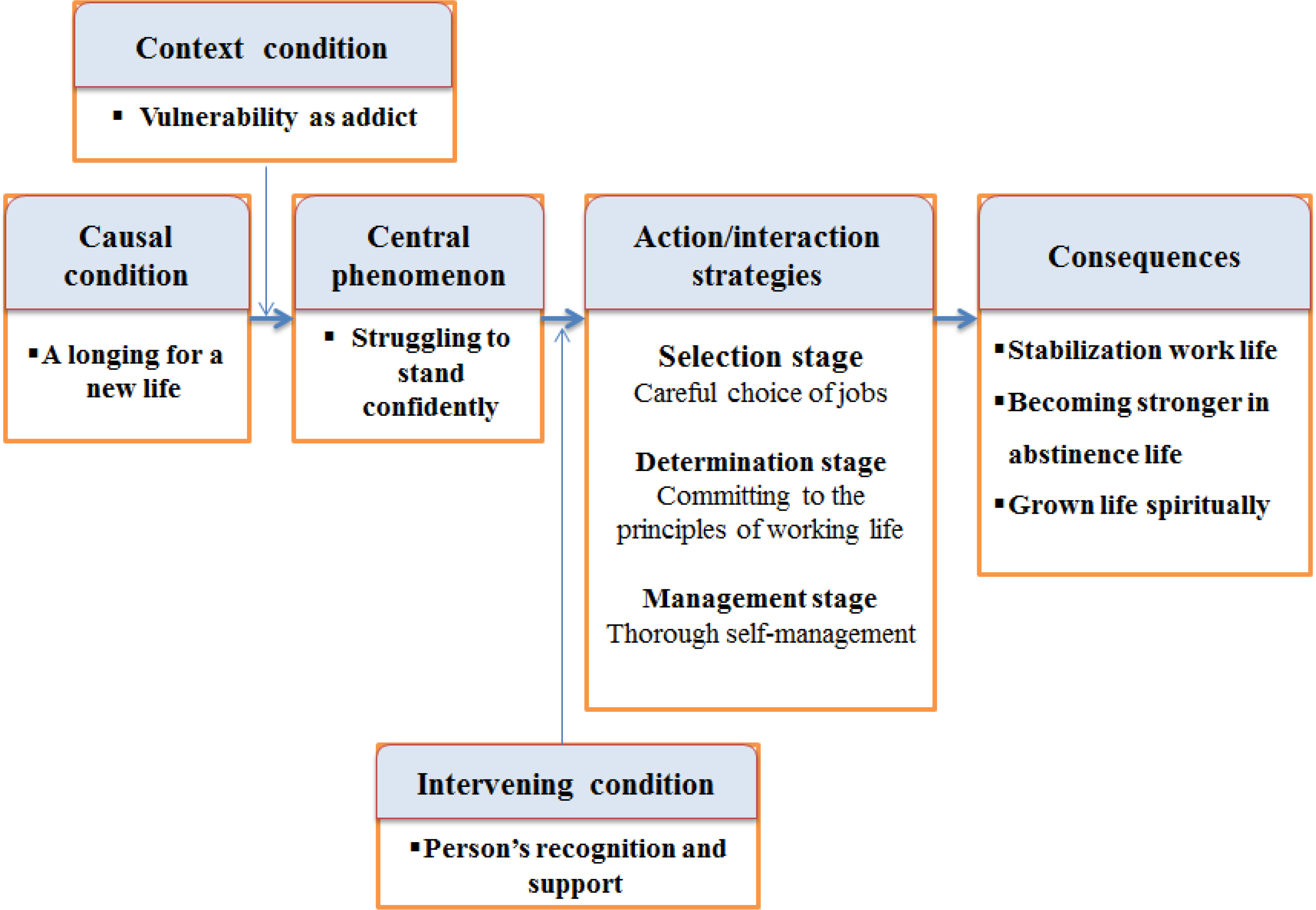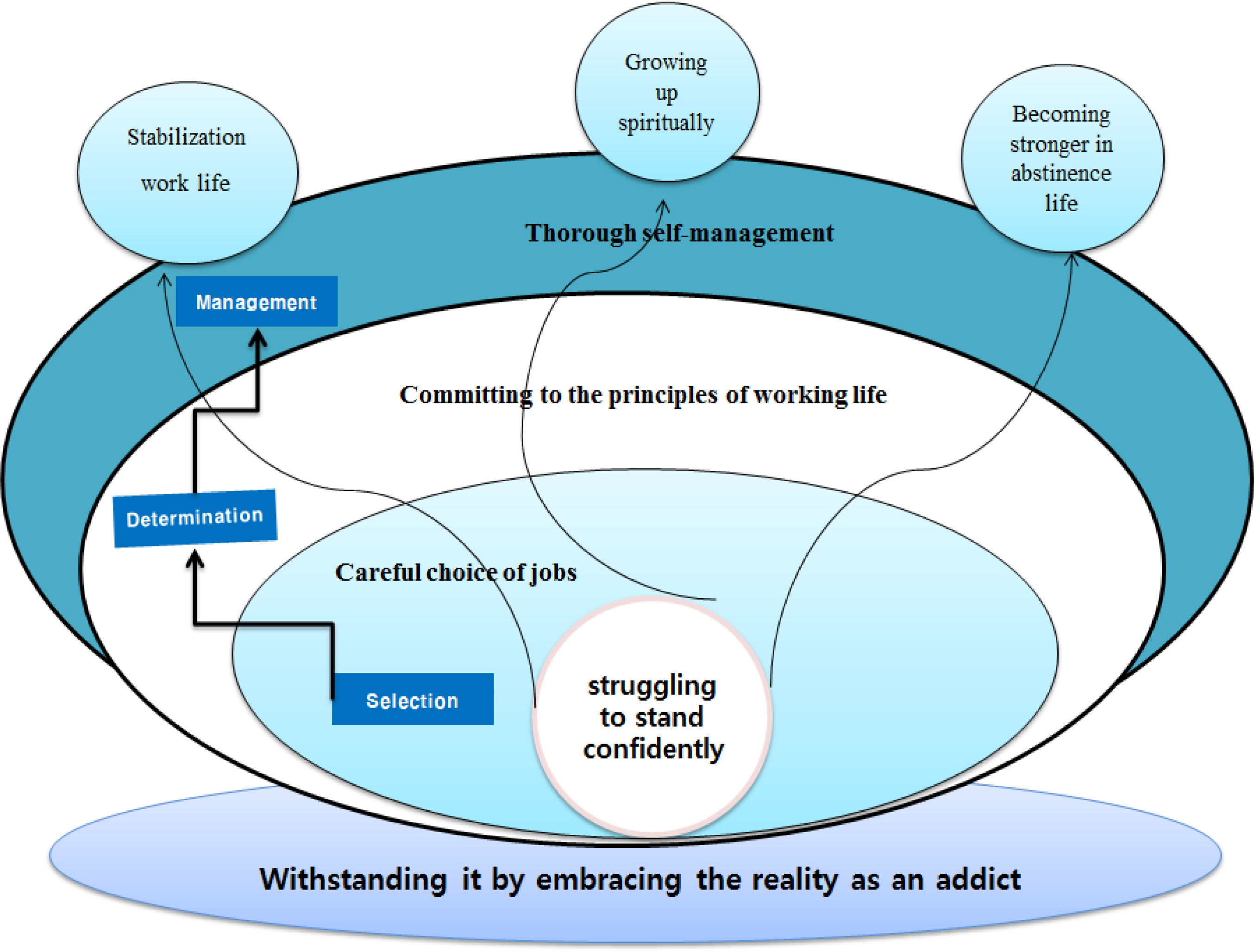J Korean Acad Psychiatr Ment Health Nurs.
2018 Sep;27(3):216-226. 10.12934/jkpmhn.2018.27.3.216.
Adaptation Process in the Workplace in Korean Adults with Alcohol Use Disorder
- Affiliations
-
- 1Adjunct Professor, Department of Nursing, Chunnam Techno University, Gokseong, Korea.
- 2Associate Professor, Department of Nursing, Dongshin University, Naju, Korea. callm68@hanmail.net
- KMID: 2422594
- DOI: http://doi.org/10.12934/jkpmhn.2018.27.3.216
Abstract
- PURPOSE
This purpose of study was to describe the adaptation process in the workplace in Korean adults with alcohol use disorder.
METHODS
Twelve participants were recruited at hospital outpatients, Alcoholic Anonymous, and addiction treatment centers from October 2016 to January 2017. Inclusion criteria were Korean adults aged 18 and older who were diagnosed with alcohol use disorder and had a job for at least one year. Data were analyzed using Strauss and Corbin's grounded theory method.
RESULTS
From open coding, 74 final concepts, 18 sub-categories, and 10 categories were identified. Results showed that the central phenomenon was "˜struggling to stand confidently'. The core categories were "˜withstanding life by embracing reality as an addict', and the adaptation process appeared "˜selection stage', "˜determination stage', and "˜management stage'. The adaptation process of Korean adults with alcohol use disorder in the workplace was compared to "˜pearl in oyster', which can be a process of breaking through pain.
CONCLUSION
Our study findings provide an in-depth understanding of the experiences of an alcoholic's job life. Mental health nurses need to be actively involved in developing vocational rehabilitation programs for addicts.
Keyword
MeSH Terms
Figure
Reference
-
1. Hong JP, Lee DW, Ham BJ, Lee SH, Sung SJ, Yoon T, et al. The survey of mental disorders in Korea 2016. Seoul: Ministry of Health and Welfare;2017. April. Report No. 11-1352000-000564-13.2. Choi CS, Ha KH, Lee SL. Gyeonggi poverty alcoholism prevention and support system to build research. Gyeonggi Welfare Foundation Policy Research Report. Gyeonggi-do: Gyeonggi Welfare Foundation;2015. December. Report No. Policy Research Report.p. 2015–13.3. Vaishnavi R, Karthik MS, Balakrishnan R, Sathianathan R. Caregiver burden in alcohol dependence syndrome. Journal of Addiction. 2017. Article ID 8934712: 1-6.https://doi.org/10.1155/2017/8934712.
Article4. Cho KH. A phenomenological study on return to work of recovering alcoholics. [dissertation]. [Pyeongtaek]: Pyeongtake University;2013. p. 120.5. Yi YS, Ue MJ. Vocational rehabilitation process to help alcoholics adjust to their society. Journal of Korean Alcohol Science. 2005; 6(1):63–71.6. Lee SJ, Choi SS. Study of alcoholics' life-by utilizing photo-voice. Social Science Research Kyungsung University. 2014; 30(3):43–71.7. Joung HJ, Lee MY, Kim HK, Lee EJ. Abstinence experience in males with alcohol use disorder. Journal of Korean Academy of Psychiatric and Mental Health Nursing. 2018; 27(1):54–63. https://doi.org/10.12934/jkpmhn.2018.27.1.54.
Article8. West SL. The utilization of vocational rehabilitation services in substance abuse treatment facilities in the U.S. Journal of Vocational Rehabilitation. 2008; 29(2):71–75.9. Hong MY, Jo MG. A qualitative case study on the recovery experience of alcoholics. Korean Journal of Qualitative Research in Social Welfare. 2018; 12(1):135–162.10. Park AR. Recovery experiences of Korean alcoholics: being reborn [dissertation]. [Seoul]: Ewha Womans University;2008. p. 147.11. An ES, Seo JM. Concept analysis of motivation for vocational rehabilitation in persons with mental disabilities. Journal of Korean Academy of Psychiatric and Mental Health Nursing. 2015; 24(4):279–289. https://doi.org/10.12934/jkpmhn.2015.24.4.279.
Article12. Walls RT, Moore LC, Batiste LC, Loy B. Vocational rehabilitation and job accommodations for individuals with substance abuse disorders. Journal of Rehabilitation. 2009; 75(4):35–44.13. Holtyn AF, DeFulio A, Silverman K. Academic skills of chronically unemployed drug-addicted adults. Journal of Vocational Rehabilitation. 2015; 42(1):67–74. https://doi.org/10.3233/JVR-140724.
Article14. Augutis M, Rosenberg D, Hillborg H. The meaning of work: perceptions of employed persons attending maintenance treatment for opiate addiction. Journal of Social Work Practice in the Addictions. 2016; 16(4):385–402. https://doi.org/10.1080/1533256X.2016.1235419.
Article15. Song EJ, Lee JY. Effects of appreciation program for alcoholics' families. The Korean Journal of Rehabilitation Psychology. 2018; 25(1):1–8.16. Barbieri B, Dal Corso L, Di Sipio AM, De Carlo A, Benevene P. Small opportunities are often the beginning of great enterprises: the role of work engagement in support of people through the recovery process and in preventing relapse in drug and alcohol abuse. Work. 2016; 55(2):373–383. https://doi.org/10.3233/WOR-162411.
Article17. Kim YC. Qualitative research methodology IImethods. 2nd ed.Paju: Academypress;2015. p. 679.18. Corbin J, Strauss A. Basics of qualitative research: techniques and procedures for developing grounded theory. 4th ed.Thousand Oaks, CA: Sage Publications;2008. p. 400.19. Guba EG, Lincoln YS. Fourth generation evaluation. Newbury Park, CA: Sage Publications;1989. p. 250.20. No CH. Recovery experience of chronic mentally ill in vocational rehabilitation program. Journal of Korean Academy of Psychiatric and Mental Health Nursing. 2002; 11(1):5–18.21. Kim MY, Byun EK. Experience of people with mentally disabled for work drop-out. Journal of Korean Academy of Psychiatric and Mental Health Nursing. 2015; 24(3):178–187. https://doi.org/10.12934/jkpmhn.2015.24.3.178.
Article22. Kim GU, Kim SJ. Experience of maintaining employment for mentally disabled people: Q methodological approach. Journal of Korean Academy of Psychiatric and Mental Health Nursing. 2017; 26(1):77–87. https://doi.org/10.12934/jkpmhn.2017.26.1.77.
Article23. Byun EK, Yoon SJ. Factors influencing job stress in work experience of employees with mentally disabled. Journal of Korean Academy of Psychiatric and Mental Health Nursing. 2010; 19(4):447–456. https://doi.org/10.12934/jkpmhn.2010.19.4.447.
Article24. Lee SH, Shin SM. The influences the spirituality has on the rehabilitation of the addiction of the alcoholics who are in a therapeutic community using the DAYTOP model. Korean Journal of Christian Counseling. 2011; 22:253–274.25. Hong MY. Understanding the life of a female recovering from alcohol addiction based on a life history approach. Mental Health and Social Work. 2017; 45(2):33–59. https://doi.org/10.24301/MHSW.2017.06.45.2.33.
Article26. van Niekerk L. Participation in work: a source of wellness for people with psychiatric disability. Work. 2009; 32(4):455–465. https://doi.org/10.3233/WOR-2009-0856.
Article
- Full Text Links
- Actions
-
Cited
- CITED
-
- Close
- Share
- Similar articles
-
- Differences in Coping and Adaptation Processing, Organizational Socialization according to the New Nurse's Experience of Bullying in Workplace
- Factors Influencing Field Adaptation in Newly Graduated Nurses
- Abstinence Experience in Males with Alcohol Use Disorder
- The Adaptation Process of Male Students in Colleges of Nursing
- Neuroimaging in Alcohol use Disorder



